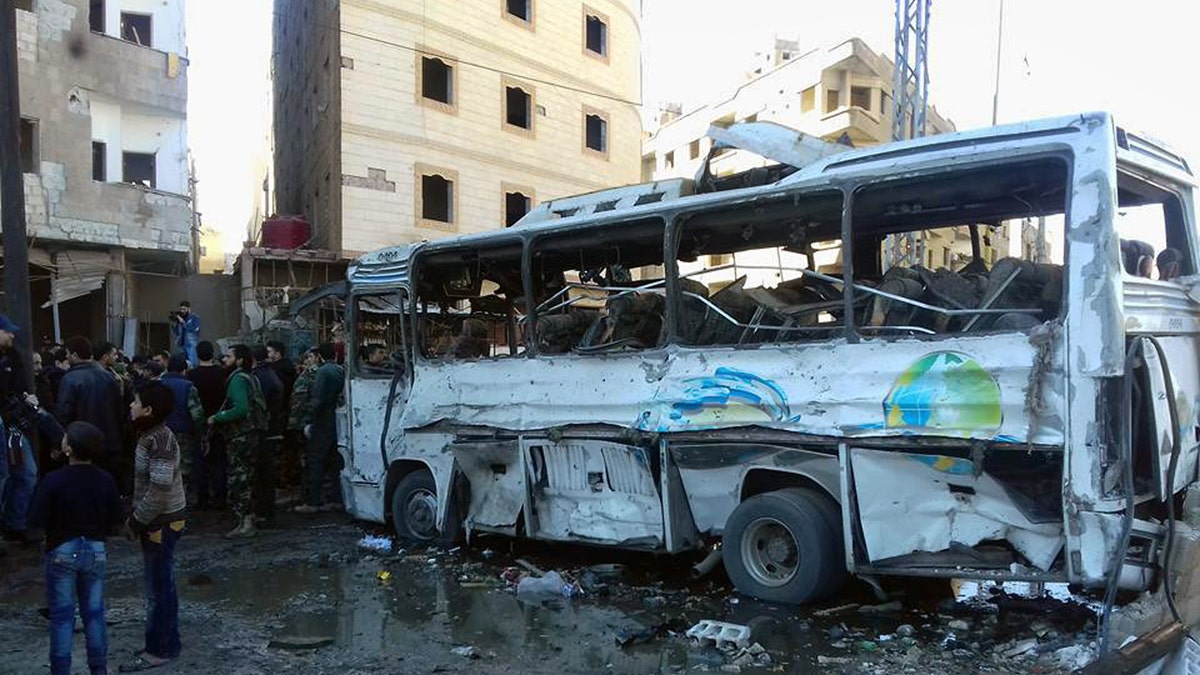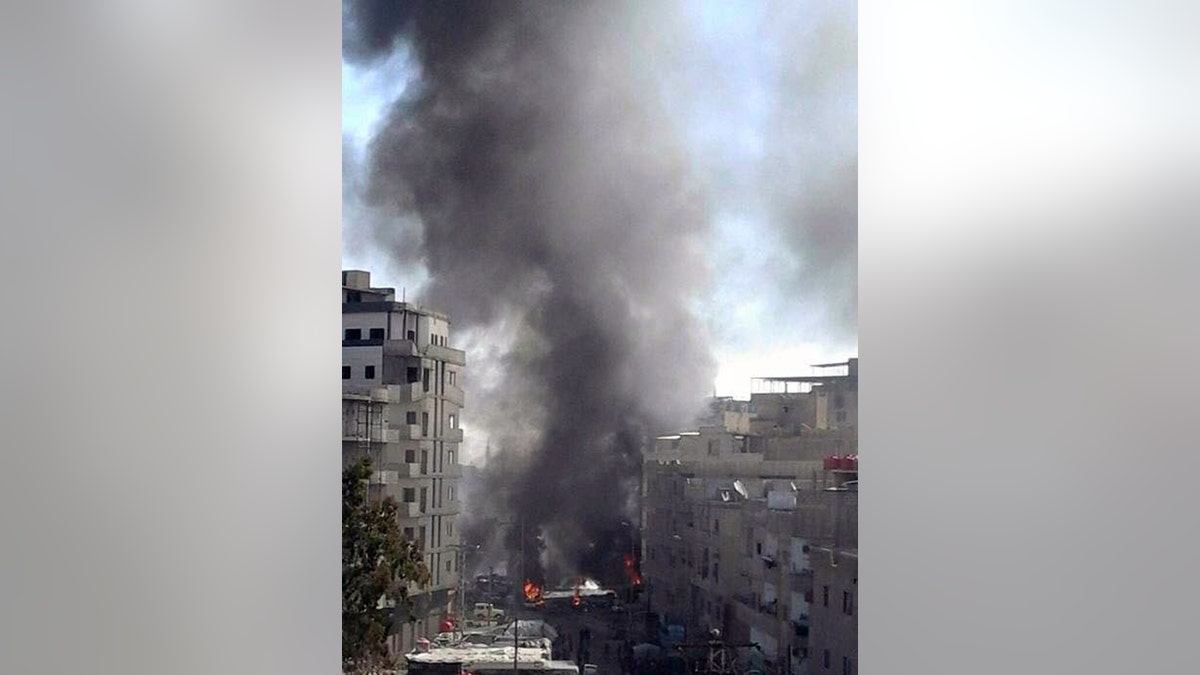
ISIS claimed responsibility for a triple bombing in Damascus. (SANA via AP)
Hours after an ISIS-claimed triple bombing killed at least 50 in Damascus, Secretary of State John Kerry on Sunday addressed the ongoing Syrian conflict, speaking starkly about a humanitarian crisis in which starving villagers have been forced to eat grass and leaves, but also hopefully of creating a “peaceful, pluralistic Syria.”
That optimistic note, however, was overshadowed by the deadly blasts in the Syrian capital, which Kerry mentioned near the end of his speech.

Smoke rises in Damascus after a triple bombing. (SANA via AP)
Syria's state news agency SANA said the bombings went off in Sayyda Zeinab, a predominantly Shiite Muslim suburb of Damascus. The blasts went off about 600 yards from one of the holiest shrines for Shiite Muslims. SANA said the attackers detonated a car bomb at a bus stop and that two suicide bombers then set off more explosives as rescuers rushed to the area.
State TV showed several burning cars and a scorched bus, as well as blown out windows, twisted metal and large holes in the facade of a nearby apartment building. The golden-domed Shiite shrine itself was not damaged.
At least 50 people were killed, the Syrian Foreign Ministry said, with more than 100 wounded.
The Syrian Observatory for Human Rights, a Britain-based opposition group that monitors the conflict, said at least 63 people were killed, including 25 pro-government Shiite fighters. It said the dead fighters included Syrians and foreigners.
The suburb is one of the first areas where Lebanon's Hezbollah group sent fighters in 2012 to protect it from Sunni extremists who vowed to blow up the shrine. Hezbollah and Shiite groups from Iraq are known to have fighters in the area.
An ISIS-affiliated website said the blasts were carried out by members of the extremist group, which controls large areas in both Syria and Iraq.

Syrians gather at the spot where bombs exploded in Damascus. (SANA via AP)
As Damascus attempted to recover from the fresh carnage, groups from both sides of the Syrian conflict endeavored to push on after a rocky start to U.N.-hosted indirect peace talks in Geneva.
“The world needs to push in one direction: Stopping the oppression and suffering of the Syrian people and ending, not prolonging, this war,” said Kerry, who spoke from Geneva.
The talks got off to a rocky start Friday, with U.N. Special Envoy to Syria Staffan de Mistura meeting only with a Syrian government delegation. The main opposition group, the Saudi-backed Higher Negotiations Committee or HNC, boycotted the session, saying it won't take part until preliminary demands are met: the release of detainees, the end of the bombardment of civilians by Russian and Syrian forces, and the lifting of government blockades on rebel-held areas.
On Sunday, de Mistura paid an informal visit to the HNC delegation, saying he is "optimistic and determined" about the talks.
HNC spokesman Salem al-Mislet told The Associated Press that the violence against civilians must stop first, saying the U.N. Security Council should put "pressure on Russia to stop these crimes in Syria," he said. Moscow, which began its airstrikes in Syria in September, is a major Assad ally, along with Iran.
But Bashar Ja'afari, the head of the Syrian delegation, criticized the opposition in remarks to reporters.
"Those who speak about preconditions are coming to this meeting in order to derail it," he said. "With the opposition's delegation not showing up, it shows that they are not serious and irresponsible at a time when Syrians are being killed."
Ja'afari added that the Damascus-area bombings "confirms what the Syrian government has stated before — that there is a link between terrorism and the sponsors of terrorism from one side, and some political groups, who claim that they are against terrorism."
Assad's government has long referred to all those fighting to overthrow him as terrorists, but has agreed to negotiations with some armed groups in the latest talks.
On Saturday night, Syrian Information Minister Omar al-Zoubi told state TV the Assad government will "never accept" the inclusion in the peace talks of two militant groups it considers terrorists.
Ahrar al-Sham and the Army of Islam, two Islamic groups fighting to overthrow Assad, agreed to take part in the Geneva talks. The ultraconservative Ahrar al-Sham is not part of the team sent to Geneva, but the delegation has named Army of Islam official Mohammed Alloush as its chief negotiator.
Alloush told AP he is heading to Geneva for the talks.
While virtually all parties agree that ISIS and the Al Qaeda-linked Nusra Front should be excluded from the talks, the two sides are divided over Ahrar al-Sham and the Army of Islam. The mainstream opposition views both as fellow rebels, despite their ideological differences, while Syria's government and Russia view them as extremists.
The Associated Press contributed to this report.
